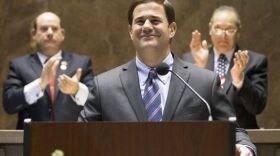Last weekend, the Arizona state legislature passed a $9.1 billion budget, which includes significant cuts to some state services including higher education. Arizona Public Radio’s Ryan Heinsius recently spoke with Flagstaff Republican Representative Bob Thorpe, chairman of the Government and Higher Education Committee, about the cuts.
Ryan Heinsius: Critics of this budget have said the deep cuts to education, hospitals through Medicaid, and other programs will do deep damage to state institutions. Could a balanced budget have been achieved over the course of a few years in order to lessen that blow?
Bob Thorpe: Unfortunately, there just isn’t enough money to go around to just fund everything as usual. And what you’re suggesting, if we don’t do those cuts, then what we’re doing is—as I mentioned a moment ago—we’re on track in this budget year, in 2016 coming up, three-quarters of a billion dollars deficit. And so, I think that what we did with the budget, it’s painful but we’re trying to address that deficit, we’re trying to get to a point where we have a positive revenue flow for the state and that’s going to help as far as funding K through 12, Child Protective Services, our hospitals, as well as higher education.
RH: Many critics have said Arizona’s budget deficit wouldn’t be nearly as steep if the legislature was willing to postpone scheduled corporate tax cuts. Tell me why lawmakers have been resistant to putting off those tax breaks.
BT: I truly believe when you have low taxes that’s going to spur economic growth. By positioning ourselves, being very competitive when it comes to our taxing policies, means we’re going to be able to get those high-paying jobs coming to Arizona, which will help improve our economy.
RH: A recently released economic impact study showed that Northern Arizona University creates one in five jobs in Coconino County and brings in nearly $2 billion to the state annually. A cut of nearly $18 million would be a serious loss to NAU. So, how does this budget benefit the northern Arizona economy?
BT: Well, because the university is still receiving funding, of course. They’re not receiving as much as what we’d hoped we’d get to the university. We have a requirement, a constitutional requirement, to have a balanced budget. We are now on track to actually have a positive cash flow, if you will, by 2017 or 18.
RH: The current budget also zeroes out funds for two of the largest community colleges in Arizona. Some in the state are saying this budget puts Arizona at a disadvantage for competing for 21st-century jobs. Is this true?
BT: They’re all short term cuts though. We’re not talking about making these cuts and having them permanent. We were extremely concerned that we didn’t want to cut funding, for example, to Coconino Community College, to any of our rural community colleges. I truly believe that our community colleges are extremely important, especially for businesses to be able to send their employees back and get additional job training. NAU is going to be impacted probably in a greater way than our other two universities, and so I was very concerned to try to keep that impact to a bare minimum. Whenever we’re talking about trying to get a statewide budget there’s a lot of concerns that are all competing for those dollars. As we’re able to get back on our feet financially, more monies will be available.








